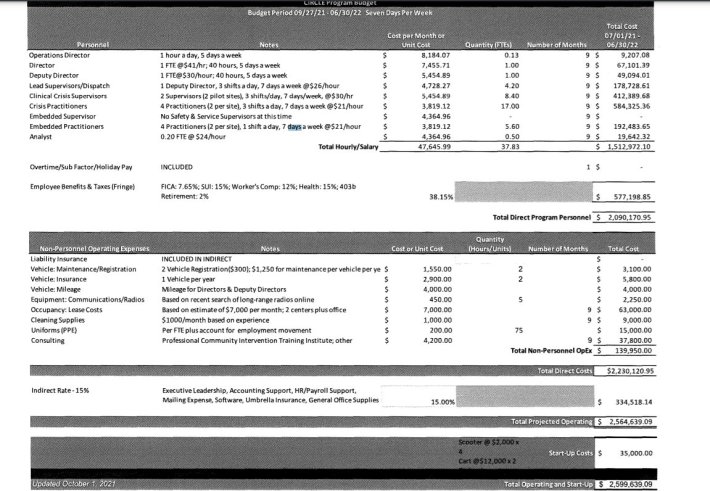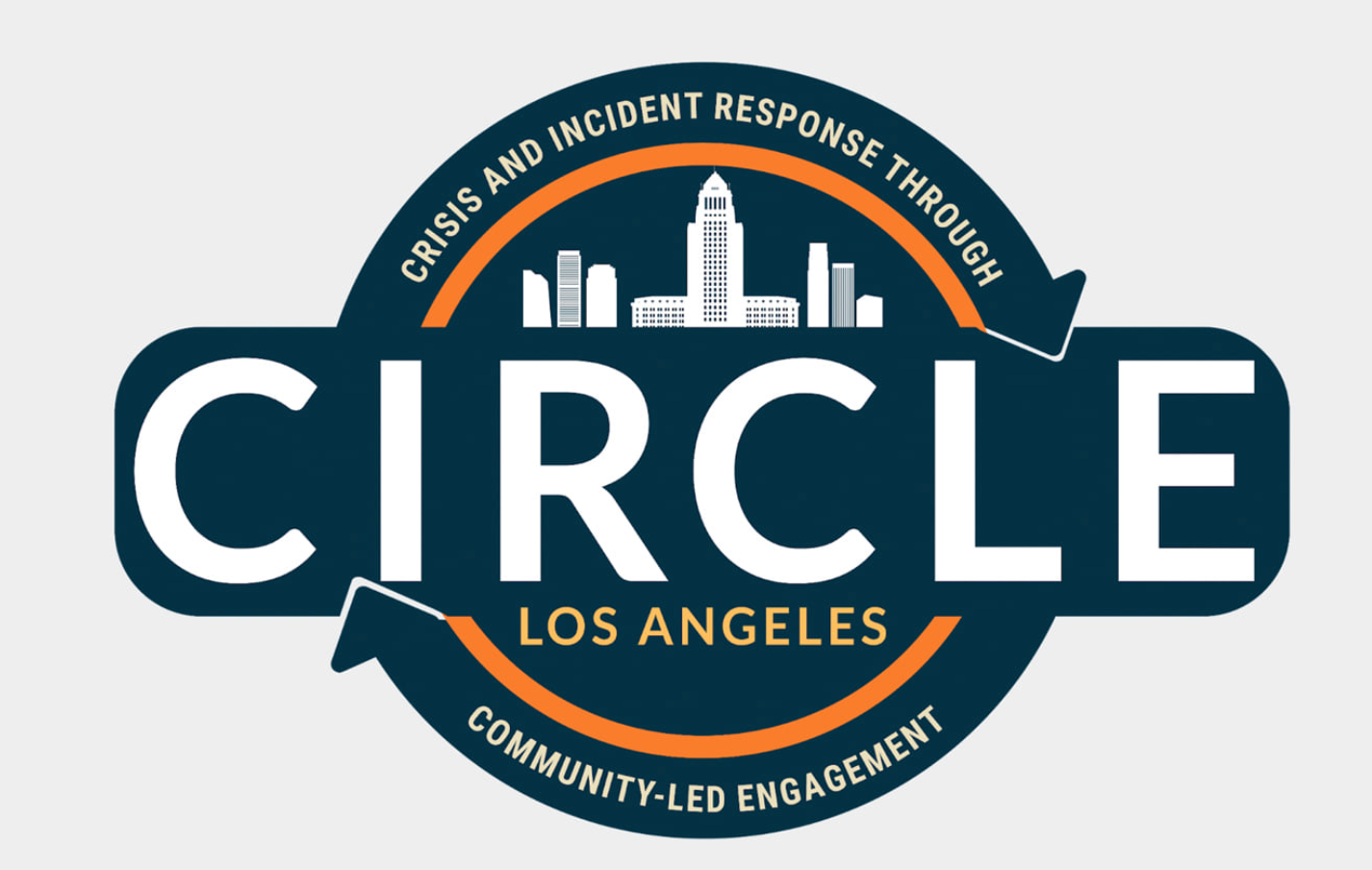Earlier this month, Councilmember Mike Bonin announced an expansion of sorts for the "Crisis and Incident Response through Community-Led Engagement "(CIRCLE) pilot program designed to reduce interactions between people experiencing a mental health emergency and armed police. CIRCLE operators and crisis response teams have begun responding to diverted 911 calls, including those related to unhoused individuals and involving wellbeing checks, loitering, indecent exposure, noise disturbances, and needle disposal in the pilot program areas of Venice and Hollywood.
CIRCLE was announced last November by Mayor Eric Garcetti. Initially, the program deployed teams on the street to foster relationships with people experiencing homelessness. With this expansion, non-emergency 911 calls in Hollywood and Venice involving a person experiencing homelessness will be routed to CIRCLE teams instead of the police. The pilot program is scheduled to extend only through June 30, 2022.
"We are actively re-examining and updating how we handle the delivery of health services, especially to people who are not only experiencing homelessness, but who are also grappling with mental health and substance abuse issues," said Councilmember Mitch O'Farrell, who represents Hollywood in a press statement last November. "The CIRCLE program will help us meet people where they are and allow practitioners to thoughtfully respond to people's complex needs, without compromising public safety."
Hollywood and Venice may seem like odd choices to launch a pilot program on homelessness because the councilmembers that represent these areas frequently disagree on what actions to take on homelessness, and they often vote differently on legislation concerning sweeps, cleanups, and outreach. Following a sweep of Echo Park last summer in O'Farrell's district that included an armed police presence and clashes with protestors, Bonin even took the rare step of criticizing the actions of a city councilmember inside the district they represent. However, when it comes to the CIRCLE program the two seem to be on the same page.
"By allowing outreach teams and trained individuals to respond, we can provide the most appropriate intervention - whether it is through mental health, a licensed behavioral health clinician, a community ambassador, or with light sanitation work - we can de-escalate situations as they arise and refer people to local service providers," wrote Bonin on a Facebook post announcing the expansion.
For years, Bonin has pushed for a move away from armed police responses to many 911 calls. He prefers a system that deploys crisis response teams made up of counselors, social workers, and medical professionals - when there is no immediate threat to someone's well being. These sorts of unarmed response programs have proven successful in other municipalities, including the CAHOOTS (Crisis Assistance Helping out on the Streets) program in Eugene, Oregon. In the fall of 2020, Bonin hosted CAHOOTS Manager Ben Adam Climer on the What's Next L.A.? podcast to promote the idea of bringing CAHOOTS or a similar program to Los Angeles.
But CIRCLE is not CAHOOTS. Some of the differences between the two programs are that CAHOOTS is citywide, while CIRCLE is only available in some communities. CAHOOTS also covers many different types of mental health and non-emergency situations, not just those involving unhoused people.
There are many barriers and questions that CIRCLE must address to be successful. These include: How will 911 operators work with the CIRCLE team? Are there enough CIRCLE employees to respond to the calls? How can CIRCLE responders help people experiencing homelessness if the intake and short-term housing systems are already overtaxed? How, if at all, can CIRCLE manage local housed people who are literally advocating on social media to lie to 911 operators to insure armed responses to non-violent incidents?
For advocates of the rights of unhoused Angelenos, reducing points of contact between unhoused persons and police untrained in outreach is a laudable goal. Without an offer of support, there will likely be little benefit for a person on the receiving end of a police response. It's certainly no secret that the social safety net for those experiencing homelessness is overstressed in Los Angeles City and County. Over the years Streetsblog has documented how shortages of supportive and affordable housing lead to backlogs throughout a system that should help people transitioning from living on the street into temporary and then permanent housing. On any given night in Los Angeles there are tens of thousands of people living on the street and only a handful of shelter beds available.
When Mayor Eric Garcetti announced his 2021-2022 budget, $3 million was set aside for Urban Alchemy to manage the CIRCLE program. However, after an outcry from other service providers about the no-bid contract, the city announced a Request for Proposals (RFP). Urban Alchemy eventually did win the grant, with the RFP process resulting in a pilot program almost fifteen percent less expensive than what the mayor originally budgeted - just under $2.6 million.

The budget includes a wage of $21 per hour for the crisis practitioners who will be the on-the-street people responding to calls. People with knowledge of other proposals say that this salary number is too low to attract the strongest candidates.
For comparison's sake, the CAHOOTS program offers a range of $15-18 for similar positions. For a single adult without children living in Eugene, Oregon, a living wage is calculated to be $15.72 by MIT's Living Wage Calculator. In Los Angeles County, an equivalent living wage is $19.35 - so the two programs arguably offer comparable wages that are close to the estimated living wage.
Urban Alchemy has been a controversial choice for the program. In addition to CIRCLE, Urban Alchemy runs the city’s mobile shower and restroom program, has "clean teams" working on streets with encampments, and operates several interim housing facilities. Urban Alchemy employs formerly homeless people for their outreach teams, which can mean greater compassion and understanding for the people they are helping. However, UA's role in the aforementioned Echo Park evictions last summer - and their presence at other homeless sweeps - has made them unpopular with advocates.
You might have seen our Skid Row Clean team in your area. The team comprised of homeless and formerly homeless residents of the community are up every morning at 5 a.m. working to prevent trash and debris build up in the city of L.A. pic.twitter.com/boiBFQrX7I
— Urban Alchemy (@UrbanAlchemyUA) January 14, 2022
UA outreach teams have been on the ground in both Venice and Hollywood since the announcement of the CIRCLE program in November. They are already working with local 911 call centers and the LAPD on ensuring a smooth transition to CIRCLE responses when appropriate.
A last barrier - which seems almost surreal to talk about - is that some reactionary, housed Venice residents are actively advising people to lie when they call 911 to encourage an armed response from police whether one is needed or not. This advice is foolhardy for a couple of reasons, not the least of which is that if/when a dangerous crime is being reported, the response would come from the LAPD. CIRCLE teams would not be dispatched - which makes the advice seem to be targeted toward criticizing Bonin and the CIRCLE program that he shepherded.
CIRCLE and the councilmember's offices are aware of this social media campaign and don't believe that it is has the reach to impact the overall effectiveness of the program. However, pushing for a police response when it's not necessary would not only waste police resources, it would undermine the ability of both the CIRCLE teams and the police to effectively do their jobs.
Of course, there are many people in Venice (and Hollywood) who have a different view. Mike Bravo, a life-long resident of Venice and a member of the Neighborhood Council, sees programs such as CIRCLE as long overdue.
“I don’t understand how that hasn’t been happening already," he said in a phone interview about CIRCLE. "It makes too much sense, and that this isn’t happening already speaks to the irrationality of the response in some of the gentrified communities."






